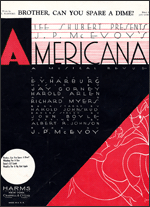Unemployment, Hunger and Deprivation

"Brother Can You Spare a Dime?"
New York: Harms, 1932.
Jay Gorney & E. Y. Harburg.
Jay Gorney, one of the most active writers of popular
songs during the 1920s and 1930s, was a graduate of the University of
Michigan in 1917 (A.B.) and in 1919 (LL.B.). After only one year in
the practice of law, Gorney moved to New York City and established a
very successful musical career. He wrote songs and directed and
produced musical plays, revues, and movies. Some of his best-known
songs were composed for Broadway shows, such as this famous
depression-era song, "Brother, can you spare a dime?", written for
the musical revue, Americana, which opened on Broadway in
1932. The Jay Gorney Papers were donated to the University of
Michigan in 1969.
"Yip" (Edgar Yipsel) Harburg was born Irwin Hochberg in 1896 or 1898
on Manhattan's Lower East Side. When his small business failed during
the Great Depression, he rapidly became successful as a lyricist.
Over the years, he collaborated with many composers, including,
Vernon Duke, Jerome Kern, and Jay Gorney, who wrote the music for
"Brother, Can You Spare a Dime?"; Harburg also wrote the lyrics for
shows such as Finian's Rainbow and films such as The Wizard
of Oz. His long list of hit songs includes "April in Paris,"
"It's Only a Paper Moon," "Over the Rainbow," and "How are Things in
Glocca Morra?" Harburg's Hollywood career came to a halt in the early
1950s when he was blacklisted. A Marxist and a democratic socialist,
but never a Communist, he was staunch advocate of a variety of
radical causes. He died on March 5, 1981 in Brentwood,
California.